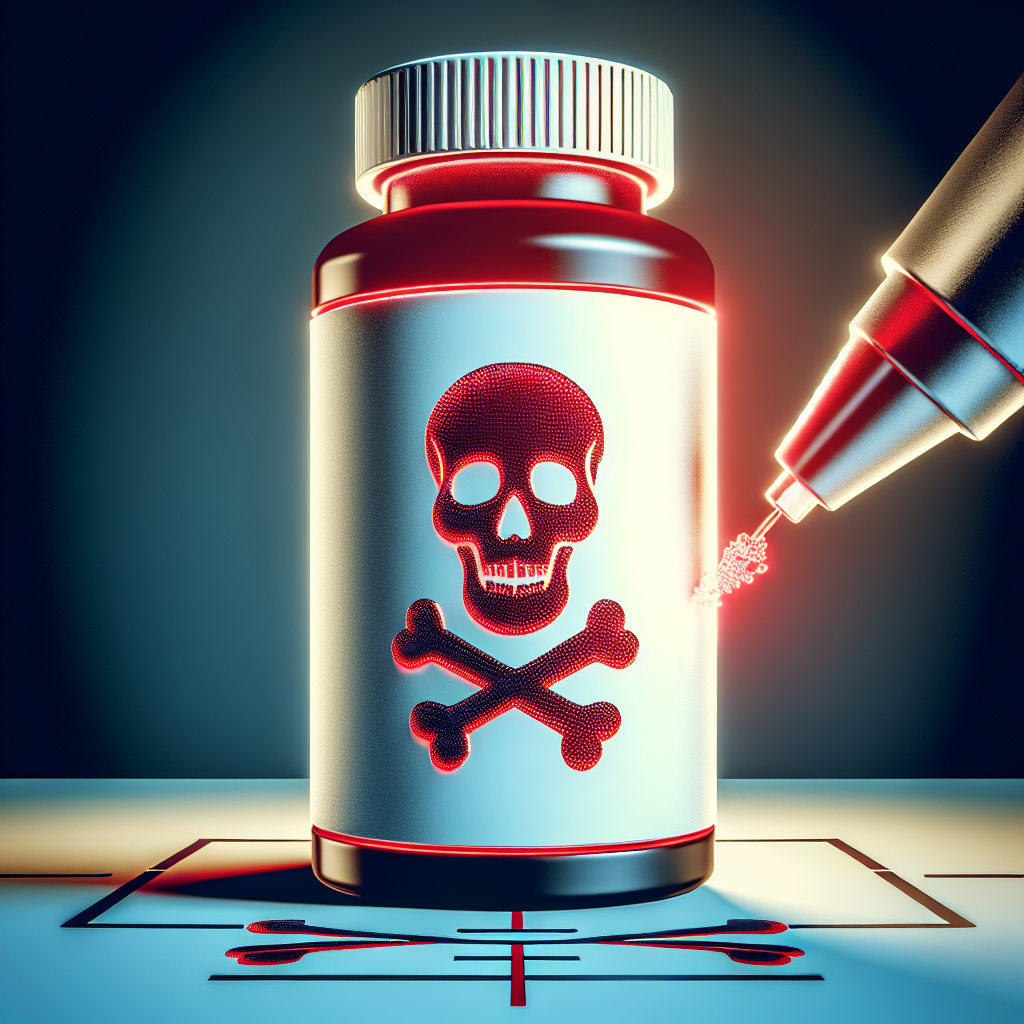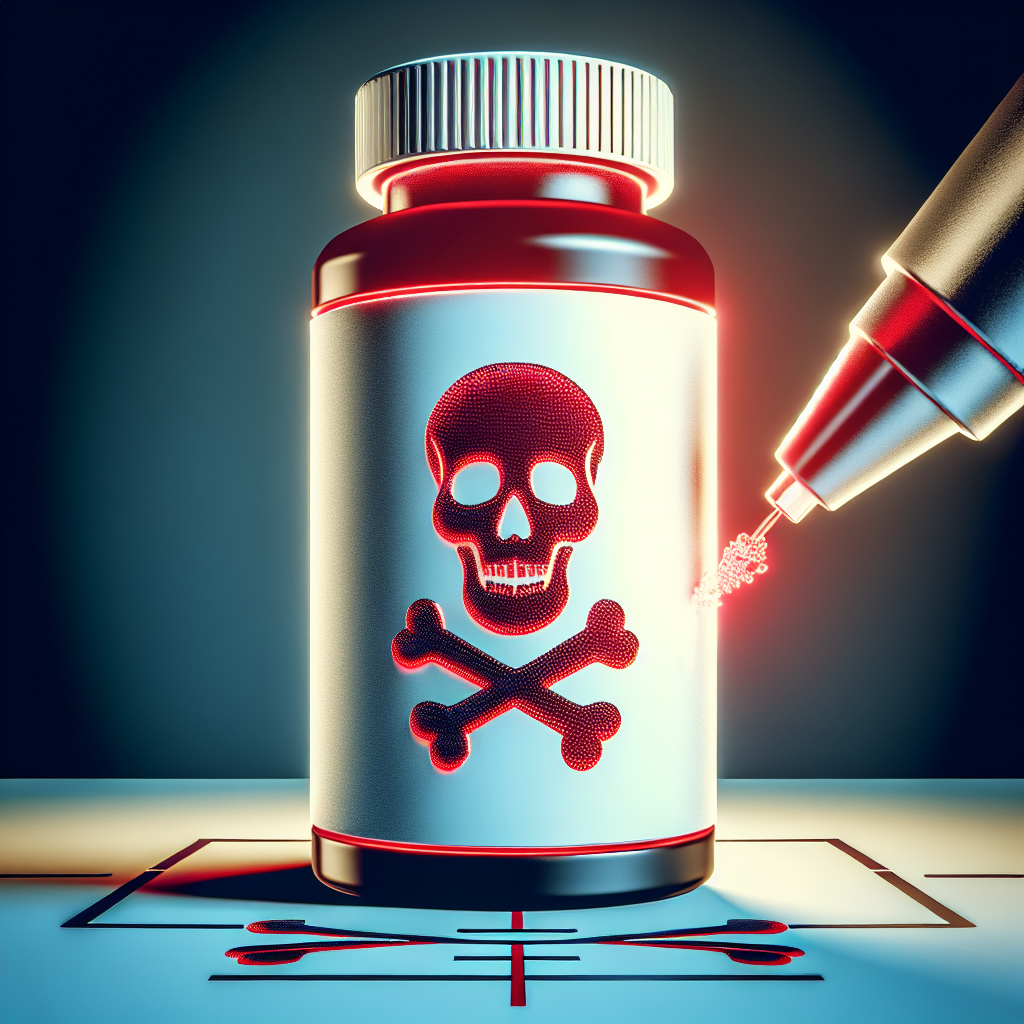In the world of dietary supplements, it’s important to make informed choices for your wellbeing. With countless options available to enhance your health, it can be overwhelming to determine which ones to embrace and which ones to steer clear of. In this article, we shed light on the supplements that should be avoided, helping you navigate through the vast sea of choices with confidence and ensuring you make the best decisions for your overall wellness.

Potential Health Risks of Supplements
In recent years, the popularity of dietary supplements has skyrocketed. From vitamins and minerals to herbal remedies and sports performance enhancers, there seems to be a supplement for every health concern. However, it’s important to recognize that not all supplements are created equal. While some may offer benefits, others can pose potential health risks. In this article, we will explore the potential health risks of supplements, highlighting the lack of regulation and quality control, adulterated or contaminated products, potential interactions with medications, toxicity and overdose, and increased risk for certain conditions.
Lack of Regulation and Quality Control
One of the major concerns with dietary supplements is the lack of regulation and quality control. Unlike prescription medications, which undergo rigorous testing and regulation by the Food and Drug Administration (FDA), supplements are not subject to the same level of scrutiny. This means that the purity, potency, and safety of supplements can vary greatly from one product to another. Without proper regulation and quality control measures in place, consumers are left vulnerable to potential harm.
Adulterated or Contaminated Products
Another risk associated with dietary supplements is the potential for adulterated or contaminated products. In an industry that lacks strict oversight, some supplement manufacturers may not adhere to proper manufacturing practices, leading to the inclusion of harmful substances in their products. This can be especially concerning when it comes to herbal supplements, as they often contain multiple ingredients that can be difficult to verify for safety and quality. Additionally, supplements sourced from overseas may be more prone to contamination, as they are subject to less stringent regulations than those manufactured in the United States.
Potential Interactions with Medications
If you’re taking any prescription medications, it’s important to be aware of potential interactions with supplements. Certain supplements can interfere with the way medications are metabolized in the body, resulting in decreased efficacy or increased side effects. For example, St. John’s Wort, a commonly used herbal supplement for depression, can induce liver enzymes, affecting the metabolism of various medications. Therefore, it’s crucial to consult with your healthcare provider before starting any new supplement to ensure it won’t negatively interact with your current medications.
Toxicity and Overdose
While supplements are intended to provide health benefits, it’s important to remember that more is not always better. Some supplements can have toxic effects on the body, especially when taken in excessive amounts. For example, high doses of vitamin A can lead to vitamin A toxicity, causing symptoms such as dizziness, nausea, and even liver damage. Similarly, excessive intake of iron supplements can lead to iron poisoning, which can be life-threatening. It’s crucial to follow recommended dosage guidelines and not exceed the recommended daily intake unless advised by a healthcare professional.
Increased Risk for Certain Conditions
In some cases, supplements may actually increase the risk for certain health conditions. For example, research has shown that taking calcium supplements without also ensuring an adequate intake of vitamin D can increase the risk of kidney stones. Similarly, excessive intake of certain antioxidants, such as beta-carotene and vitamin E, has been associated with an increased risk of certain cancers. It’s important to recognize that supplements are not a one-size-fits-all solution, and certain individuals may be more susceptible to adverse effects than others. It’s crucial to speak with a healthcare professional to assess your individual needs and potential risks.
Supplements with Limited Evidence
While some supplements have been extensively researched and proven to be beneficial, others lack sufficient evidence to support their claims. It’s essential to approach these supplements with caution and be aware of the limited evidence supporting their use. In this section, we will explore weight loss supplements, memory and cognitive enhancers, hair growth supplements, and anti-aging supplements.
Weight Loss Supplements
Weight loss supplements are often marketed as a quick fix for shedding pounds, but their effectiveness and safety remain questionable. Many of these supplements claim to suppress appetite, boost metabolism, or burn fat, but the evidence supporting these claims is limited. Some popular weight loss supplements, such as Garcinia cambogia and green coffee bean extract, have shown minimal effects in clinical studies, and their long-term safety is not well-established. It’s essential to focus on maintaining a healthy diet and exercise routine rather than relying solely on weight loss supplements.
Memory and Cognitive Enhancers
With the rising interest in cognitive health, memory and cognitive enhancers have gained popularity. Supplements like Ginkgo biloba, Bacopa monnieri, and omega-3 fatty acids are often touted as brain-boosting aids. While some studies suggest potential benefits, the evidence is not yet conclusive. Additionally, the effects of these supplements may vary among individuals, making it challenging to determine their true efficacy. It’s important to foster brain health through a balanced diet, regular exercise, and engaging in mentally stimulating activities, rather than solely relying on cognitive enhancer supplements.
Hair Growth Supplements
Many people are eager to find solutions for hair loss or thinning hair, leading them to explore hair growth supplements. However, the science behind these supplements is limited. Biotin is one of the most commonly marketed hair growth supplements, but its effectiveness is still under debate, with conflicting results from studies. Other supplements like saw palmetto and marine proteins claim to promote hair growth but lack substantial evidence. It’s best to consult with a dermatologist or trichologist if you’re concerned about hair loss, as they can provide personalized recommendations based on your specific condition.
Anti-Aging Supplements
The quest for eternal youth has led to the rise of anti-aging supplements, claiming to reverse the visible signs of aging. Supplements like resveratrol, collagen peptides, and coenzyme Q10 are often marketed as youth-preserving agents. While these supplements may have some antioxidant properties and potential benefits, the evidence regarding their anti-aging effects is limited. Aging is a complex process influenced by various factors, including genetics, lifestyle, and environmental factors. Relying solely on anti-aging supplements may not provide the desired results. It’s crucial to focus on a well-rounded approach to aging gracefully, which includes adopting a healthy lifestyle, proper skincare, and regular medical check-ups.

Supplements with Controversial Ingredients
Certain supplements contain controversial ingredients that raise concerns about their safety. These ingredients have been associated with potentially harmful effects and should be approached with caution. Let’s explore some of these controversial ingredients, including ephedra, yohimbe, DMAA, and androstenedione.
Ephedra
Ephedra, also known as ma huang, is a herb that has been used in traditional Chinese medicine for centuries. It gained popularity as a weight loss and energy-boosting supplement in the 1990s. However, due to reports of serious adverse effects, including heart attacks and strokes, the FDA banned the sale of ephedra-containing dietary supplements in 2004. Ephedra stimulates the nervous system and can increase blood pressure and heart rate, potentially leading to cardiovascular problems. It’s crucial to avoid supplements containing ephedra due to the significant health risks associated with its use.
Yohimbe
Yohimbe is an extract derived from the bark of the African yohimbe tree. It has been used traditionally as an aphrodisiac and is now marketed as a sexual enhancer and fat burner. However, yohimbe has been linked to adverse effects such as increased blood pressure, rapid heart rate, and anxiety. It may also interact with medications and exacerbate certain medical conditions. Due to these concerns, it’s best to avoid supplements containing yohimbe and explore safer alternatives for sexual enhancement or weight loss.
DMAA
DMAA (dimethylamylamine) is a stimulant commonly found in pre-workout and weight loss supplements. It acts as a vasoconstrictor, narrowing blood vessels and increasing blood pressure. The use of DMAA has been associated with adverse effects such as high blood pressure, heart palpitations, and even serious cardiovascular events. Many countries, including the United States, have banned the sale and use of dietary supplements containing DMAA due to safety concerns. To protect your health, it’s important to read supplement labels carefully and avoid products containing DMAA.
Androstenedione
Androstenedione is a hormone precursor that can be converted to testosterone and estrogen in the body. It gained popularity as a performance-enhancing supplement in the 1990s, especially among athletes and bodybuilders. However, the use of androstenedione has been associated with adverse effects such as liver damage, hormonal imbalances, and increased risk of certain cancers. The sale of androstenedione as a dietary supplement is prohibited in the United States, and its potential risks far outweigh any potential benefits. It’s best to avoid supplements containing androstenedione and focus on natural methods to support athletic performance and overall health.
Herbal Supplements and Safety Concerns
Herbal supplements have been used for centuries to treat various ailments and promote overall well-being. However, not all herbal supplements are safe, and some can pose significant risks to your health. In this section, we will explore some herbal supplements with safety concerns, including St. John’s Wort, Kava, Aconite, Comfrey, Coltsfoot, and Pennyroyal Oil.
St. John’s Wort
St. John’s Wort is a herbal supplement commonly used for its supposed mood-lifting and antidepressant effects. While some studies have shown potential benefits for mild to moderate depression, St. John’s Wort can interact with a wide range of medications, including birth control pills, antidepressants, and anticoagulants. These interactions can lead to decreased efficacy, increased side effects, and adverse health outcomes. It’s crucial to consult with a healthcare professional before using St. John’s Wort to ensure it won’t interfere with any medications you may be taking.
Kava
Kava, also known as Piper methysticum, is a plant native to the South Pacific islands. Its root is traditionally used to make a beverage with sedative and anxiolytic effects. However, concerns have been raised about its potential to cause liver damage. Several cases of severe liver toxicity, including liver failure and the need for liver transplantation, have been reported in individuals who consumed kava supplements. Due to these safety concerns, many countries, including Canada and several European countries, have banned or restricted the sale of kava-containing supplements. It’s important to prioritize your liver health and avoid supplements containing kava.
Aconite
Aconite, also known as monkshood or wolfsbane, is a highly toxic plant that has been used in traditional Chinese medicine for its analgesic and anti-inflammatory properties. However, aconite contains potent cardiotoxic and neurotoxic compounds known as aconitine and related alkaloids. These compounds can cause severe arrhythmias, respiratory paralysis, and even death. Due to its high toxicity, aconite should be avoided in all forms, including dietary supplements.
Comfrey
Comfrey, also known as Symphytum officinale, is a plant traditionally used to treat wounds, muscle pain, and joint inflammation. However, comfrey contains pyrrolizidine alkaloids (PA), which can cause liver damage and potentially lead to cancer. The use of comfrey has been restricted or banned in many countries due to its hepatotoxic effects. To protect your liver health, it’s crucial to avoid supplements containing comfrey and seek alternative treatments for your health concerns.
Coltsfoot
Coltsfoot, also known as Tussilago farfara, is another medicinal plant with safety concerns. It has been traditionally used to treat coughs and respiratory ailments. However, coltsfoot contains pyrrolizidine alkaloids (PA), similar to comfrey, which can cause liver damage and potentially lead to cancer. Several countries, including Canada and Germany, have restricted or banned the use of coltsfoot-containing supplements. It’s important to prioritize your respiratory health and opt for safer alternatives for managing coughs and respiratory conditions.
Pennyroyal Oil
Pennyroyal oil is derived from the leaves of the pennyroyal plant, an herb often used for its supposed abortifacient properties. However, pennyroyal oil is highly toxic and can cause severe liver and kidney damage, as well as life-threatening complications. The use of pennyroyal oil for any purpose should be strongly discouraged, and it should never be ingested or applied topically. If you’re considering using pennyroyal oil or any other herbal remedy, it’s crucial to consult with a healthcare professional to ensure your safety and well-being.

Sports and Workout Supplements
Sports and workout supplements are popular among athletes and fitness enthusiasts looking to enhance their performance and achieve their fitness goals. However, not all sports supplements are safe or effective. In this section, we will explore some sports and workout supplements with potential risks, including anabolic steroids, caffeine powder, creatine, beta-alanine, and nitric oxide boosters.
Anabolic Steroids
Anabolic steroids are synthetic variations of testosterone, a hormone naturally produced by the body. They are often used illegally to enhance athletic performance and muscle growth. However, anabolic steroid use can have serious health consequences, including liver damage, heart problems, hormonal imbalances, and psychiatric effects. These substances are classified as controlled substances and are illegal without a prescription. It’s crucial to prioritize your health and avoid the use of anabolic steroids.
Caffeine Powder
Caffeine is a common ingredient found in many sports and workout supplements, claiming to enhance energy, focus, and endurance. However, caffeine powder, which is often used in high doses to achieve these effects, can be extremely dangerous. The concentrated nature of caffeine powder can lead to severe caffeine overdose, resulting in symptoms such as rapid heartbeat, seizures, and even death. It’s important to be cautious when consuming any products containing caffeine and to follow recommended dosage guidelines.
Creatine
Creatine is a naturally occurring compound in the body that plays a role in energy production. It is often used as a supplement to enhance muscle strength and performance. While creatine is generally considered safe when used as directed, excessive or prolonged use may lead to side effects such as gastrointestinal distress, muscle cramps, and dehydration. It’s crucial to follow recommended dosage guidelines when using creatine and to stay properly hydrated.
Beta-Alanine
Beta-alanine is an amino acid that is often included in sports supplements aimed at improving muscle endurance and reducing fatigue. While beta-alanine is generally safe, it can cause a harmless but uncomfortable tingling sensation in the skin called paresthesia. This side effect is temporary and usually subsides within an hour. However, some individuals may find this sensation unpleasant. It’s important to be aware of this potential side effect when considering supplements containing beta-alanine.
Nitric Oxide Boosters
Nitric oxide boosters, such as L-arginine and L-citrulline, are often included in sports supplements to enhance exercise performance and increase blood flow. While nitric oxide is a naturally occurring molecule involved in various physiological processes, the effectiveness of these supplements in improving performance is still a subject of debate. Additionally, high doses of nitric oxide boosters can cause gastrointestinal issues and may interact with certain medications. It’s important to consult with a healthcare professional before using nitric oxide boosters, especially if you have any underlying medical conditions.
Supplements for Heart Health
Heart health is of paramount importance, and many individuals turn to supplements to support cardiovascular well-being. However, it’s crucial to choose heart health supplements wisely and be aware of their potential benefits and risks. In this section, we will explore some supplements commonly used for heart health, including red yeast rice, garlic, coenzyme Q10, and fish oil.
Red Yeast Rice
Red yeast rice is a traditional Chinese remedy made by fermenting rice with a specific type of yeast. It contains naturally occurring compounds called monacolins, including lovastatin, which is a commonly prescribed cholesterol-lowering medication. Red yeast rice has shown promising effects in reducing LDL cholesterol levels; however, the levels of active monacolins can vary significantly between products. It’s important to choose reputable brands to ensure the quality and consistency of red yeast rice supplements. Additionally, it’s crucial to consult with a healthcare professional before using red yeast rice, as it can interact with certain medications and may not be suitable for everyone.
Garlic
Garlic has been used for centuries for its potential health benefits, including cardiovascular support. It is believed to have anti-inflammatory, antioxidant, and blood pressure-lowering effects. Some studies suggest that garlic supplementation may modestly reduce blood pressure and have favorable effects on cholesterol levels. However, the evidence is not yet fully conclusive, and the effects may vary among individuals. It’s important to note that garlic supplements can interact with certain medications, including anticoagulants, so it’s essential to consult with a healthcare professional before using them.
Coenzyme Q10
Coenzyme Q10 (CoQ10) is a compound naturally produced by the body that plays a crucial role in cellular energy production. It is found in various organs, including the heart, and is believed to have antioxidant and cardiovascular protective properties. Some studies suggest that CoQ10 supplementation may benefit individuals with heart failure or certain heart conditions. However, the evidence is still limited, and more research is needed to establish its efficacy. CoQ10 is generally well-tolerated, but it can interact with certain medications, including blood thinners. It’s important to consult with a healthcare professional before using CoQ10 to ensure its safety and appropriateness for your specific situation.
Fish Oil
Fish oil is a rich source of omega-3 fatty acids, which are essential for heart health and overall well-being. Omega-3 fatty acids have been shown to have anti-inflammatory effects, reduce triglyceride levels, and potentially lower the risk of cardiovascular events. Numerous studies have demonstrated the benefits of omega-3 supplementation, particularly in individuals with high triglyceride levels or a history of cardiovascular disease. However, it’s important to choose high-quality fish oil supplements to ensure purity and potency. Additionally, fish oil supplements can interact with certain medications, including blood thinners, so it’s crucial to consult with a healthcare professional before starting supplementation.

Supplements for Weightlifting and Bodybuilding
Weightlifting and bodybuilding require dedication, discipline, and proper nutrition to achieve desired results. While some supplements may offer benefits for muscle growth, strength, and recovery, caution must be exercised. In this section, we will explore some supplements commonly used in weightlifting and bodybuilding, including DHEA, deer antler velvet, Tribulus Terrestris, HMB, and ZMA.
DHEA
Dehydroepiandrosterone (DHEA) is a hormone naturally produced by the body, and supplements are often marketed as aids for muscle growth, strength, and energy. While DHEA levels naturally decline with age, the use of DHEA supplements for performance enhancement is controversial and not supported by scientific evidence. Additionally, DHEA supplementation can have side effects, including hormonal imbalances, acne, and potential interactions with other medications. It’s crucial to consult with a healthcare professional before using DHEA supplements, especially if you have any underlying medical conditions.
Deer Antler Velvet
Deer antler velvet is a substance derived from the antlers of young deer before they harden. It is often marketed as a muscle-building and performance-enhancing supplement due to its supposed content of insulin-like growth factor 1 (IGF-1). However, scientific evidence supporting the claims of deer antler velvet is limited. Moreover, the extraction process may involve harming or distressing animals. It’s important to consider the ethical implications of using deer antler velvet and consult with a healthcare professional before considering its use.
Tribulus Terrestris
Tribulus Terrestris is a plant widely used in traditional medicine for various purported benefits, including increased testosterone levels and improved athletic performance. However, scientific evidence supporting these claims is limited and inconsistent. Tribulus Terrestris supplements may have little to no effect on testosterone levels or muscle growth. It’s important to prioritize a nutritious diet, regular exercise, and adequate rest for optimal performance, rather than relying solely on Tribulus Terrestris supplements.
HMB
Beta-hydroxy beta-methylbutyrate (HMB) is a metabolite of the amino acid leucine. It is often used in weightlifting and bodybuilding supplements to aid in muscle growth and prevent muscle breakdown. While some studies suggest potential benefits, the overall evidence supporting the use of HMB remains limited. It may have more noticeable effects in individuals who are new to resistance training or in certain clinical populations. It’s important to note that HMB is naturally found in small amounts in the diet, and excessive supplementation may not necessarily yield additional benefits.
ZMA
ZMA is a combination supplement consisting of zinc, magnesium, and vitamin B6. It is often marketed as a sleep aid and muscle recovery enhancer. While zinc and magnesium play important roles in various physiological processes, including muscle function, the evidence regarding the benefits of ZMA supplementation is limited. Some studies suggest potential benefits in specific populations, such as athletes undergoing intense training or individuals with zinc or magnesium deficiencies. However, more research is needed to evaluate its efficacy in the general population. If you’re considering ZMA supplementation, it’s recommended to consult with a healthcare professional to assess your individual needs and potential benefits.
Supplements for Sexual Enhancement
Sexual enhancement supplements are widely marketed, promising improved libido, stamina, and performance. However, it’s crucial to approach these supplements with caution and be aware of potential risks. In this section, we will explore some supplements commonly used for sexual enhancement, including Yohimbe, Tongkat Ali, Maca, and DHEA.
Yohimbe
As mentioned earlier, Yohimbe is an herbal supplement commonly marketed for sexual enhancement. While it may have potential benefits for some individuals experiencing sexual dysfunction, the safety of Yohimbe is a concern. Yohimbe can increase heart rate and blood pressure, potentially leading to adverse cardiovascular effects. It can also interact with certain medications, including antidepressants and alpha-blockers. It’s crucial to consult with a healthcare professional before using Yohimbe or any other supplements for sexual enhancement.
Tongkat Ali
Tongkat Ali, also known as Eurycoma longifolia, is a herb native to Southeast Asia often promoted for its alleged aphrodisiac effects and testosterone-boosting properties. While Tongkat Ali has shown some potential benefits in animal studies, human studies are limited, and the evidence is not yet conclusive. Moreover, the quality and consistency of commercially available Tongkat Ali supplements may vary. It’s essential to approach Tongkat Ali supplementation with caution and consult with a healthcare professional before use.
Maca
Maca is a root vegetable native to the high altitudes of the Andes mountains in Peru. It is often marketed as an energy booster and sexual performance enhancer. While Maca has been traditionally used for its supposed aphrodisiac effects, the scientific evidence supporting these claims is limited. Some studies suggest potential benefits in improving sexual desire, but larger, well-designed trials are needed to establish its effectiveness. Maca is generally considered safe, but it may interact with certain medications, such as those used to treat thyroid conditions. It’s crucial to consult with a healthcare professional before using Maca for sexual enhancement.
DHEA
As mentioned earlier, DHEA is a hormone naturally produced by the body and is often marketed as a sexual enhancement supplement. While some studies suggest potential benefits of DHEA supplementation for sexual function in certain populations, such as postmenopausal women, the evidence is still limited and not conclusive. DHEA supplements can have side effects, including hormonal imbalances and potential interactions with other medications. It’s important to consult with a healthcare professional before considering DHEA supplements for sexual enhancement.

Vitamin and Mineral Supplements to Limit
Vitamin and mineral supplements can be beneficial for individuals with specific deficiencies or certain health conditions. However, it’s important to recognize that excessive intake of certain vitamins and minerals can have harmful effects on the body. In this section, we will explore some vitamin and mineral supplements that should be used with caution and in limited amounts, including Vitamin A, Vitamin E, Iron, and Magnesium.
Vitamin A
Vitamin A is an essential nutrient for various bodily functions, including vision, immune function, and cell growth. However, excessive intake of Vitamin A can lead to a condition known as hypervitaminosis A, which can cause symptoms such as dizziness, nausea, and even liver damage. Vitamin A toxicity is more likely to occur when supplements containing Vitamin A are taken in high doses or combined with other sources of Vitamin A, such as fortified foods and animal-based products. It’s important to follow recommended dosage guidelines and be mindful of your overall Vitamin A intake from all sources.
Vitamin E
Vitamin E is an antioxidant that plays a role in protecting cells from damage caused by free radicals. While Vitamin E is generally considered safe when consumed through diet, excessive intake through supplements can have adverse effects. High doses of Vitamin E can interfere with blood clotting, potentially increasing the risk of bleeding. The tolerable upper intake level for Vitamin E is 1,000 milligrams per day for adults. It’s important to follow recommended dosage guidelines and be cautious when considering Vitamin E supplementation.
Iron
Iron is an essential mineral that plays a crucial role in carrying oxygen throughout the body. Iron deficiency can lead to anemia, fatigue, and impaired immune function. While iron supplementation is necessary for individuals with diagnosed deficiencies, excessive iron intake can be harmful. Iron overload can cause symptoms such as organ damage, joint pain, and even heart problems. It’s crucial to consult with a healthcare professional before starting iron supplementation, as they can determine the appropriate dosage based on your individual needs and monitor your iron levels regularly.
Magnesium
Magnesium is involved in hundreds of biochemical reactions in the body and is essential for overall health and wellbeing. While magnesium supplementation can be beneficial for individuals with diagnosed deficiencies or certain medical conditions, excessive magnesium intake can have a laxative effect and cause diarrhea. The tolerable upper intake level for magnesium is 350 milligrams per day for adults. It’s important to follow recommended dosage guidelines and be cautious when considering magnesium supplementation, especially if you have any gastrointestinal conditions.
Conclusion
When it comes to dietary supplements, it’s crucial to be well-informed and cautious. While some supplements may offer potential benefits, others can pose significant health risks. Lack of regulation and quality control, adulterated or contaminated products, potential interactions with medications, toxicity and overdose, and increased risk for certain conditions are all potential health risks associated with supplements. Weight loss supplements, memory and cognitive enhancers, hair growth supplements, and anti-aging supplements are areas where evidence is limited. Supplements with controversial ingredients like ephedra, yohimbe, DMAA, and androstenedione should be approached with caution due to their potential risks. Herbal supplements such as St. John’s Wort, kava, aconite, comfrey, coltsfoot, and pennyroyal oil can also raise concerns about safety. Sports and workout supplements like anabolic steroids, caffeine powder, creatine, beta-alanine, and nitric oxide boosters can have potential risks and should be used wisely. Heart health supplements such as red yeast rice, garlic, coenzyme Q10, and fish oil can be beneficial when chosen wisely. When it comes to weightlifting and bodybuilding, supplements like DHEA, deer antler velvet, Tribulus Terrestris, HMB, and ZMA may have limited evidence of efficacy. Sexual enhancement supplements like Yohimbe, Tongkat Ali, Maca, and DHEA should be approached with caution due to potential risks. Lastly, certain vitamin and mineral supplements like Vitamin A, Vitamin E, iron, and magnesium should be used in limited amounts to avoid adverse effects.
Always remember to consult with a healthcare professional before starting any new supplement regimen. They can provide personalized advice based on your individual health needs and help you make informed decisions. It’s important to approach supplements with skepticism, be aware of extraordinary claims, and take the time to research and educate yourself. By being proactive and well-informed, you can prioritize your health and make choices that are best for you.

